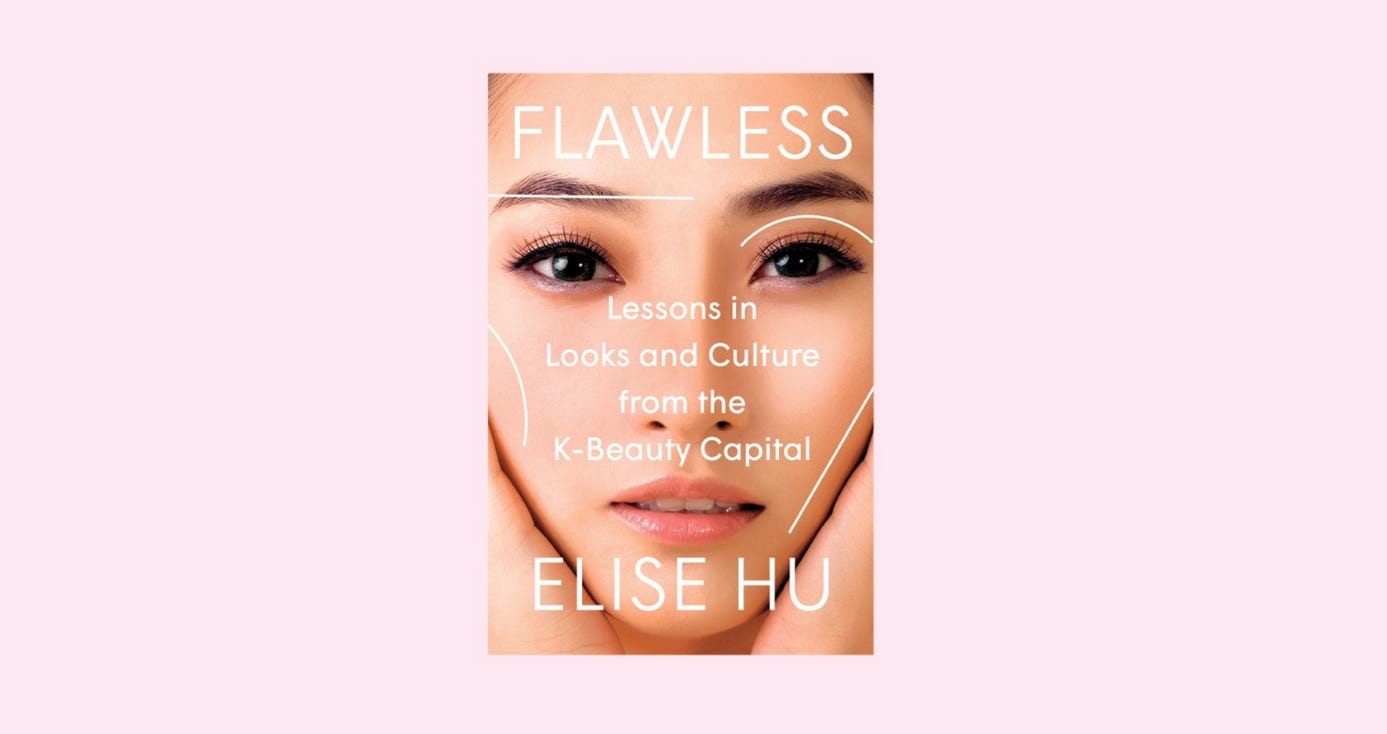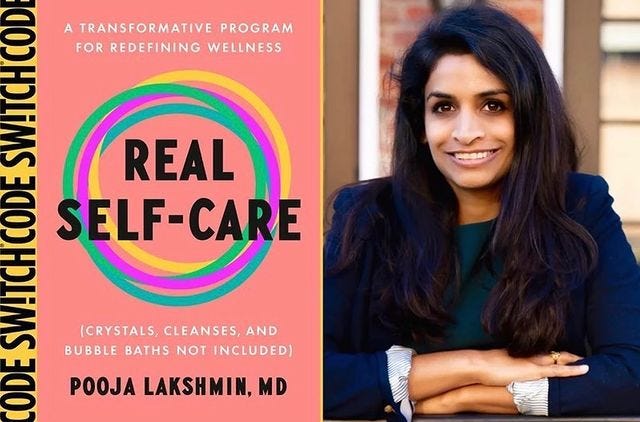There exists a question every beauty editor must answer approximately 12 times a day: “What product do you recommend for [insert skin/hair/nail/identity issue here]?” My response is usually something like, “THICK: And Other Essays by Tressie McMillan-Cottom” or “Clean: The New Science of Skin by James Hamblin.” This is pretentious of me but also genuine, as a good beauty book will effectively purge the desire for a good (“good”) beauty product.1 Ahead, seven new releases to apply to an industry-washed brain like so much serum.
Flawless: Lessons in Looks and Culture from the K-Beauty Capital by Elise Hu
Flawless is a deep and deeply-felt investigation into Korean beauty culture, from appearance expectations to skincare ingredients to product packaging to plastic surgery to the effect it all has on Korean women and the wider world. My favorite part is when writer
reveals the Korean government funds a number of K-beauty endeavors — not because the products contribute to citizens’ health and wellbeing (come on), but because the products fuel economic growth and further the country’s global influence.The Ugly History of Beautiful Things: Essays on Desire and Consumption by Katy Kelleher
“I’ve never found an object that was untouched by the depravity of human greed,” Katy Kelleher writes in her introduction to The Ugly History of Beautiful Things. The series of memoir-esque essays — one on mirrors, another on silk, more on mascara and perfume and face powder — explores how the depraved past of our beauty products contributes to our present desire for them; how ugly histories have been papered over with pretty promises of empowerment, expression, and autonomy; and how our longing for beauty remains, even after we “know better.” Also: Who else used a safety pin to separate their Maybelline Great Lash-ed eyelashes in the aughts?? I flinched reading Kelleher’s account of scratching her cornea this way; how close I came to doing the same!
Real Self-Care: A Transformative Program for Redefining Wellness (Crystals, Cleanses, and Bubble Baths Not Included) by Pooja Lakshmin
In Real Self-Care, author
argues that the commodified version of “self-care” dominating popular culture today has little to do with actual self-care and, in fact, has the opposite of its stated effect: It hurts us. (Swap the words “self-care” for “beauty” and you basically have my beliefs on the beauty industry.) This book is for anyone who’s ever removed a “relaxing” sheet mask only to realize it hasn’t transformed you so much as your trash can — now full of non-recyclable plastic and a limp pile of peptide-soaked polyester.Natural Beauty by Ling Ling Huang
The narrator of Natural Beauty is the first-generation daughter of Chinese immigrants and a former concert pianist who finds herself working for Holistik, a Goopish wellness and beauty operation (if Goop were a little less “appropriating ancient Eastern medicine practices” and a little more “on the cutting edge of cosmetic biotechnology”). The only work of fiction on this list, Natural Beauty uses elements of sci-fi, fantasy, and body horror to cut to bone-deep truths about consumerism, race, identity, appearance, and the exhausting pursuit of perfection. I particularly appreciate the stress-reducing masturbation machine writer Ling Ling Huang places in the Holistik employee break room, and the question it begs: Is “healing” the new hysteria?
Fat Talk: Parenting in the Age of Diet Culture by Virginia Sole-Smith
The last time I mentioned
in this newsletter, we were talking about how skincare culture is dewy diet culture for her podcast, Burnt Toast. Even though I’m not a parent, I plan to pick up Fat Talk: Parenting in the Age of Diet Culture for the inevitable beauty culture parallels — like this one, from a recent feature on her work in The Cut:“If you give up chasing weight loss, you invite in all of the shit that comes with being a fat person or even with being a less-thin person,” Sole-Smith says … The way she sees it, it’s really about the willingness to give up a little bit — or a lot — of privilege. She knows that’s scary. “But it’s also incredibly liberating.”
Unshrinking: How to Face Fatphobia by Kate Manne
I first found philosopher
through the New York Times (“Diet Culture Is Unhealthy. It’s Also Immoral”), then I subscribed to her newsletter (“On Bodily Non-Problems With A Name”), where she just announced her upcoming book, Unshrinking. Just as “everybody is beautiful!” is not a logical or liberating response to beauty culture, Unshrinking maintains that “the solution [to fatphobia] is not to love our bodies more,” but to “dismantle the forces that control and constrain us, and remake the world to accommodate people of every size.”Momfluenced: Inside the Maddening, Picture-Perfect World of Mommy Influencer Culture by Sara Petersen
Again, I’m not a mom, but I am fascinated by the similarities between motherhood and aesthetic labor — two traditional forms of “women’s work” that a capitalist society both demands and demeans. Author
considers the former (and how it intersects with the latter) in the brilliant and beautifully-written Momfluenced. While you wait for your order to arrive: Here’s an interview I did with Petersen for her newsletter last year, where we discuss how and where and why performing maternity overlaps with performing beauty.BONUS! Loving Sylvia Plath: A Reclamation by Emily Van Duyne
Alright, fine, this one is not really a beauty book (although Plath did write for Mademoiselle magazine at one point). But I was a guest speaker at author
's Seminar in Feminist Theory class at Stockton University last week, and we talked about standpoint theory in relation to both Sylvia Plath and skincare marketing, so my recommendation stands.Biology, sociology, and climate science agree: the beauty industry has a net-negative impact on pores, people, and the planet alike!






Thank you so much! Giving thanks for your amazing work which is so groundbreaking and brilliant 🙏❤️
Will be adding these to the top of my reading list - thank you Jessica for all your work as usual! 💜